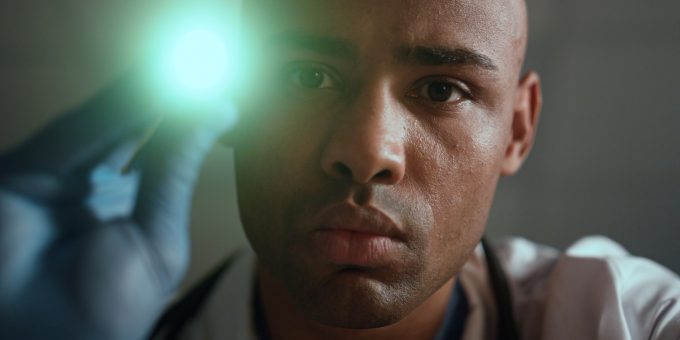
"My denials to the examiner’s probing about drugs and sexually transmitted diseases were met with doubt, and my sexual orientation as a gay man only served to compound the medical examiner’s suspicion." // iStockPhoto, stockbusters
navigating the path to legal status: an undocumented immigrant’s story, pt. 2
Part 2: “Do You Have Any Sexually Transmitted Diseases? Are You Sure?”
May 18, 2022
We arrived in Ciudad Juarez, Mexico, later that day. Stepping out of the airport, a scorching and parched air greeted our bodies, jolting us out of the daze that had rendered us speechless throughout the entire flight. Though mere miles away from the United States, Ciudad Juarez felt like an entirely different world. It resembled a dream that I was both experiencing and at the same time observing from outside my own body, devoid of any control over my life.
After reaching our hotel, we made our way to our room on the 6th floor. From the window, I could see the border and the cityscape of El Paso, Texas. Despite its proximity, the United States felt as distant and unattainable as the legal and social acceptance I longed for. As we settled into our room, we watched an unfamiliar city unfold before us, painted in the hues of a setting sun. With closed eyes, tears soaking into the cold, stiff surface of the hotel pillows, I laid there consumed by hopelessness, feeling stripped of my humanity. I felt as lifeless as the very institution that would soon determine my fate.May 20, 2022
I was in the sterile environment of a medical examination room, subject to a physical examination, chest X-ray, urine and blood tests, and a detailed inspection of my medical history. The task was simple, yet incredibly vulnerable: strip down to my undergarments and change into a medical robe. The stiff, cold fabric against my skin, the silence of the room around me, and my exposed state all compounded the unease stirring within me. I waited; my anxiety heightened by the solitude.
When the medical examiner finally arrived, her presence was as cold as the room itself. With her eyes focused on the medical chart in her hands, she appeared indifferent to the human being standing before her. Then, the questions began to flow, her voice remaining flat. “Show me your tattoos,” she demanded. “What do they mean? Have you experimented with drugs, marijuana, cocaine perhaps? Have you never been tempted? Are you certain you’ve never indulged? Any scars to account for? How did you acquire them? Any past or present sexually transmitted diseases? Are you sure?” The questions echoed in the sterile room.
Throughout the interrogation, I was periodically instructed to reveal portions of my body hidden by the thin medical robe. The medical examiner took notes as I did so, with only the scratching of her pen cutting the silence. My denials to the examiner’s probing about drugs and sexually transmitted diseases were met with doubt, and my sexual orientation as a gay man only served to compound the medical examiner’s suspicion. The medical examiner’s probing questions made me begin to question myself, wondering if she—and by extension, Immigration—knew something about me that I was unaware of. The undercurrent of racially-biased accusations of criminality and sexual deviance was relentless—ceasing only with the end of the physical examination. The examination concluded as impersonally as it had begun, with examiner’s direction to put on my clothes and proceed to the vaccination wing. We never made eye contact.Although the medical exam ostensibly serves to protect public health, it can be a punishing ordeal, rife with racial undertones and moral judgments. This process perpetuates the harmful stereotype of immigrants as innately immoral, requiring exhaustive scrutiny even when they show no signs of wrongdoing. As such, the adjustment process serves as a punishment by continually reminding immigrants that their humanity and moral character remain suspect in the eyes of the state—even when they are on the cusp of permanent residency.
Jozef C. Robles is a Ph.D. student in the Sociology Department at the University of California, Irvine. His work explores the transformative impacts of immigration law on immigrants’ lives.
Read Part 1 of this 3-part series here.

Comments